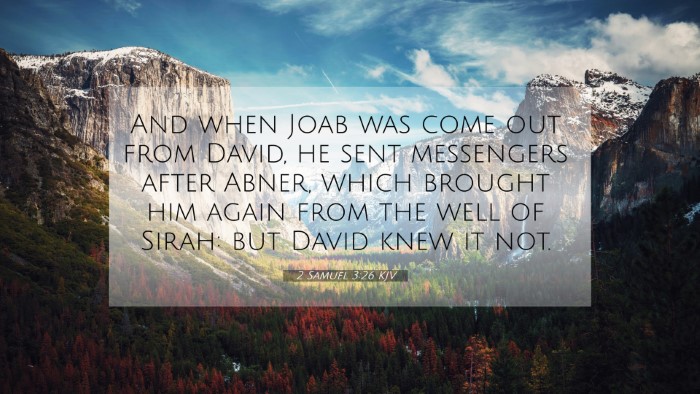Understanding 2 Samuel 3:26
2 Samuel 3:26 presents a significant moment in the narrative of David's rise to kingship and the political tensions of his time. This verse reads:
“And Joab came out from David, and sent messengers after Abner, which brought him again from the well of Sirah: but David knew it not.”
This verse showcases the complex relationships and political machinations during a turbulent period in Israel's history. To better understand it, we will explore interpretations from public domain commentaries, bringing together insights from Matthew Henry, Albert Barnes, and Adam Clarke.
Commentary Insights
Matthew Henry's Commentary
Matthew Henry emphasizes the cunning nature of Joab and the trust that David placed in him. Joab’s act of sending for Abner, unbeknownst to David, highlights the treachery and lack of integrity that Joab would display throughout the narrative. This act foreshadows the conflict between Joab’s personal ambitions and David’s desire for unity in Israel.
Albert Barnes' Notes
Albert Barnes focuses on the political implications of Abner’s return. He implies that the communication and strategies employed by Joab reflect the difficulties of establishing a united kingdom under David's rule. Barnes also notes that the secrecy of Joab’s actions indicates underlying tensions, suggesting that alliances could be fragile.
Adam Clarke's Commentary
Adam Clarke interprets Joab’s actions as a betrayal of trust. He notes that rather than supporting David’s pursuits for peace, Joab acts in his own interests. Clarke further explains that this incident is pivotal in understanding the nature of leadership challenges David faced and the personal ambitions that often conflicted with the collective good.
Bible Cross-References
This verse connects with multiple other scriptures that enrich its understanding:
- 1 Samuel 26:8: Highlights Joab’s loyalty to David yet reveals his ruthless nature.
- 2 Samuel 2:10: Introduces Abner's role in the conflict between the houses of Saul and David.
- 2 Samuel 3:30: Joab’s actions result in further bloodshed, demonstrating the consequences of his betrayal.
- 2 Samuel 5:1-3: Illustrates David’s eventual acceptance as king over all Israel, want of unity in the earlier context.
- Proverbs 25:19: Comments on reliance on unfaithful people as a broken tooth or foot out of joint; Zealous yet treacherous.
- Psalm 55:12-14: A reflection on betrayal from trusted companions, resonating with this narrative of Joab’s deception.
- Matthew 26:14-16: An example in the New Testament of betrayal, likening Joab’s actions to those of Judas Iscariot.
Thematic Connections
This verse not only provides a historical account but also reflects broader themes such as:
- Leadership Challenges: Explores the difficulties of leading a nation divided by loyalty and power struggles.
- Betrayal: The personal ambitions that jeopardize collective goals, linking the Old Testament to New Testament betrayal narratives.
- Integrity in Leadership: David’s need for trusted allies, and the contrasting qualities in Joab’s character.
Inter-Biblical Dialogue
Through the lens of inter-Biblical dialogue, we can see how 2 Samuel 3:26 sets the stage for understanding the complexity of loyalty within the scriptural context:
- Analyzing Joab’s character in light of Proverbs' teachings on trust.
- Drawing parallels between David's leadership and that of Christ’s leadership in the New Testament.
Exploring the Cross-Reference System
Using tools for Bible cross-referencing can deepen our understanding of 2 Samuel 3:26:
- Consulting a Bible concordance helps to locate themes across scriptures.
- Utilizing a cross-reference Bible study guide for a more aligned study across related texts.
- Employing methods of cross-referencing biblical themes for sermon preparation or personal study.
Conclusion
In summary, 2 Samuel 3:26 serves as a rich verse for reflection and examination of deeper themes within the Biblical narrative, presenting an intricate web of human relationships and the consequences of betrayal in leadership. The evaluations from prominent commentaries, combined with cross-references and thematic connections, allow for a comprehensive understanding of its significance in God's overarching story.




